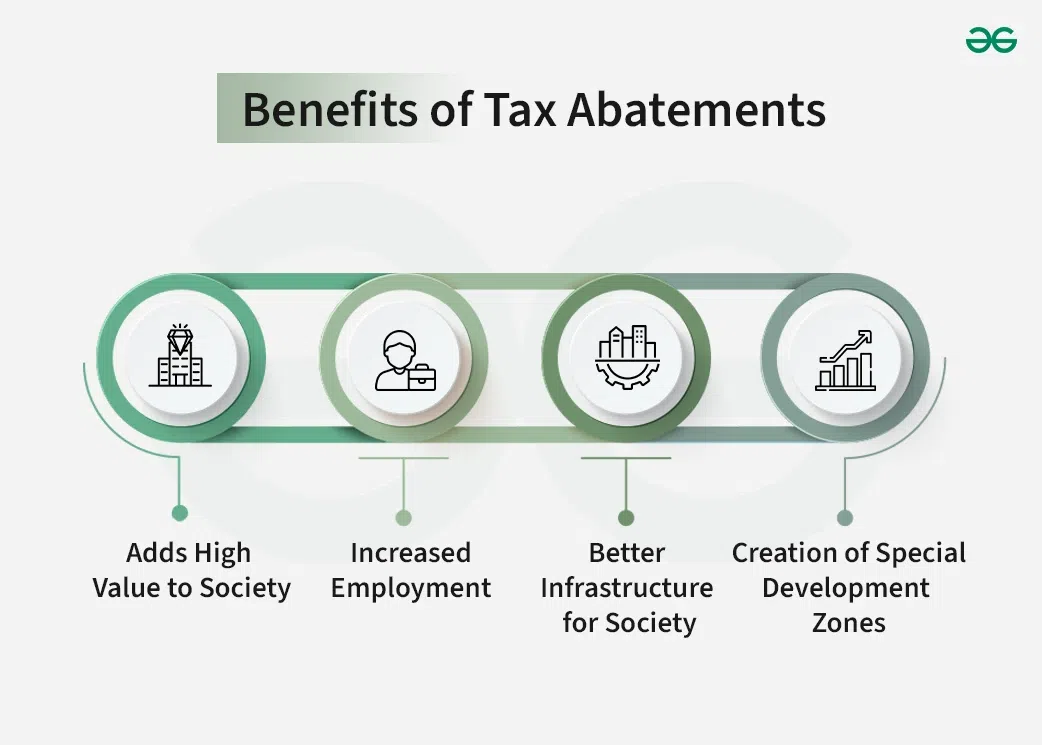Abatement: Meaning, Working and Benefits
Last Updated :
07 May, 2024
What is Abatement?
A decrease or exemption from the amount of taxes that a person or business must pay is known as an abatement.
Reductions in taxes, fines, or refunds are a few instances of abatement. An individual or corporation may ask the tax authorities for an abatement if they have overpaid their taxes or if their tax bill is excessive. In the United States, abatements are often utilized at both the state and local levels to encourage economic growth, stimulate investment, and revitalize communities. These can take the form of tax credits, exemptions, or reductions tailored to specific industries, projects, or initiatives deemed beneficial to the local economy. Additionally, municipalities may offer property tax abatements to developers or homeowners as a means of promoting urban renewal or affordable housing initiatives.

Key Takeaways
- A state or local government may grant an abatement, which is a tax cut, on specific kinds of real estate or commercial possibilities.
- A real estate tax abatement can lower a house’s property taxes temporarily or give companies tax benefits.
- An abatement is intended to promote growth or economic activity in a city or community.
- To keep industries with strong employment rates from leaving the area, governments may also provide abatements.
Working of Abatement
1. Encouraging Investment Through Tax Incentives: Governments employ abatement as a taxing tactic to promote particular endeavors, such as capital equipment investments. An example of a tax abatement is a tax incentive.
2. Revitalizing Communities Through Property Tax Relief: In real estate, abatements are often used. Property tax abatement programs are offered by certain localities, which can remove or drastically lower a home’s property tax payments for a period of years or even decades.
3. Promoting Urban Renewal and Community Development: These initiatives aim to draw purchasers to places with less demand, including inner city neighborhoods undergoing rehabilitation projects.
4. Addressing Socioeconomic Disparities: Only low-to middle-class property owners may be eligible for tax abatements in some cities, and these programs may only be offered in specific locations.
5. Streamlining the Process for Homebuyers: Purchase a qualified property, perform the necessary renovations, and apply for the abatement yourself, or acquire a property that already has an abatement. The former is far simpler since all you need to do is move in; all the hassles of building and paperwork have already been dealt with by someone else.
Benefits of Tax Abatement
1. Adds High Value to Society: The government only grants a tax break to an individual or business that does something very valuable to society. In the USA, for example, a municipal government can provide a firm with tax relief in exchange for an investment in the city, such as a new factory, warehouse, or retail facility.
2. Increased Employment: Since a target firm may eventually create additional jobs under certain circumstances, it also has the added benefit of increasing employment in the area. These companies may open a retail location in the neighborhood in exchange for a property tax break. Enhancing the area’s ease enhances its advantage for the public.
3. Better Infrastructure for Society: A company that benefits from a tax cut could be making an infrastructure investment in the community. In order for a new business to be successful, the city would need to have more roads, water lines, or electrical lines. The neighborhood where the new infrastructure is being placed benefits from this as much as the company.
4. Creation of Special Development Zones: If the cities desire to develop land, they can designate development zones. These zones provide tax breaks for any new housing building, allowing individuals to build dwellings.
Conclusion
A taxing strategy known as abatement is typically employed by various governments to encourage specific behaviors, such as the acquisition of capital equipment. One type of tax abatement is a tax incentive. One of the most popular types of tax relief offered to businesses to continue operating inside the city for a set amount of time is property tax.
Abatement- FAQs
What does abatement aim to achieve?
By reducing the property tax burden on certain projects, tax abatements help cities, countries, and special purpose districts recruit new enterprises, retain and grow existing ones, and incentivize capital investment.
What Is a 421a tax abatement?
Real estate developers that construct multi-family residential complexes in New York City are eligible for a tax exemption under the 421a tax abatement program in New York State. The purpose of the abatement is to lessen the tax burden on developers in order to support affordable housing.
What is a primary residence tax abatement?
If the owner resides in the house or condominium as their primary residence, they may be eligible for a primary residence tax abatement, which lowers their property taxes. Usually, local or municipal governments provide these abatements to lower housing costs and encourage individual homeownership.
What is a 421g tax abatement?
Lower Manhattan housing projects are encouraged by the 421g Tax Abatement, a tax incentive. The tax burden on developers who turn commercial buildings into many homes is lessened by this law.
What is a J-51 tax abatement?
J-51 is a property tax abatement program in New York City designed to promote apartment building upgrades. The law lessens the tax liability of developers who make improvements to residential real estate. The building’s location and the upgrades’ kind determine the precise amount of the tax decrease.
Note: The information provided is sourced from various websites and collected data; if discrepancies are identified, kindly reach out to us through comments for prompt correction.
Share your thoughts in the comments
Please Login to comment...